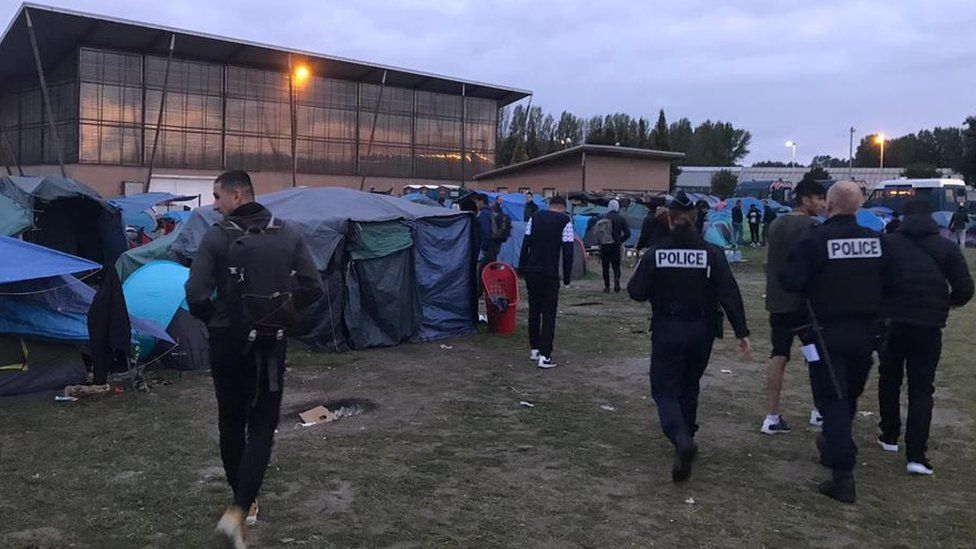French Dunkirk camp cleared as migrants try to reach UK
- Published

French police have begun an operation to evacuate a gymnasium and a tent camp near the northern port of Dunkirk amid an increase in migrants trying to cross the Channel.
Some 1,000 people, many of them Iraqi Kurds, have been living on the Grande Synthe site.
The gym was made available for migrants seeking shelter by the town last year.
Now a court has ordered the gym to be closed to migrants because of local complaints.
There are fears this may all prompt a further spike in crossings to England.
At the weekend 41 people were stopped in three small boats and a kayak by UK border officials, and 86 people were intercepted a week ago by the UK's Border Force. A further 29 migrants were stopped as they headed towards the Kent coast on Monday.
After Calais, Dunkirk is one of the closest French ports to the English coast and authorities had already moved in to clear the camp in October 2018 when almost 1,800 people lived there.
When the gym opened up to migrants in December 2018, the original aim was to close it in the spring, but by August 2019 170 people were being housed there and a further 800 were in tents nearby.
The dangers faced by migrants who cross the Channel
French authorities also cleared an area outside Calais last Friday.
What happened on Tuesday?
Gendarmes and riot police moved in at 08:00 (06:00 GMT) almost a fortnight after a judge in Lille ruled that the camp was a risk to public security. The ruling cited smugglers and criminal networks operating at Grande Synthe, as well as brawls and violence.
People were being seen being driven away in buses during the morning. Reports said the migrants had been split into families, unaccompanied minors and others. Officials said most of them would be driven to emergency shelters throughout the north-west of France.
"I reckon everyone here was happy to get out of the shantytown that Grande-Synthe has become," said local prefect Michel Lalande. "We're bringing an end to it this morning and that's good news for rule of law and human rights."
"You should know that if they ask for asylum in France, they have an 80% chance of getting it," Dunkirk official Éric Étienne told La Voix du Nord.
'Britain seen as Promised Land'
By Lesley Ashmall, BBC Radio 5 Live
People smugglers have infiltrated this camp and that is why the French authorities want it closed.
Last night we had access inside the camp and saw smugglers walking around openly, through the makeshift shops, trying to entice people to pay money to get them on boats and lorries to come to the UK.
Early this morning, hundreds of police officers arrived here along with large empty buses.
All the buses have now left and there are now some tents abandoned. Cleaners have moved in, but it's a vast job at such a big camp.
People in the camp last night seemed undeterred and some saw Britain as the Promised Land. There are migrant camps all over northern France, and charities think they will just go somewhere else. Those I spoke to, including families with small children, said they would just keep trying.
An estimated 1,000 people have crossed the Channel in small boats this year and French and UK officials are concerned about the involvement of smugglers persuading people they have to leave because of the UK government's pledge to leave the European Union by 31 October.
"Every day they try to cross by boat, very little boats and it's very dangerous but the mafia always take a lot of money," complained charity worker Claudette Hannebicque, who believes Brexit has had an impact on numbers trying to cross the Channel.
"Sometimes the police here arrest mafia or put them in prison. But here there's a 'little mafia' - the big big boss is not here," she told BBC Radio 5 Live.
- Published9 September 2021